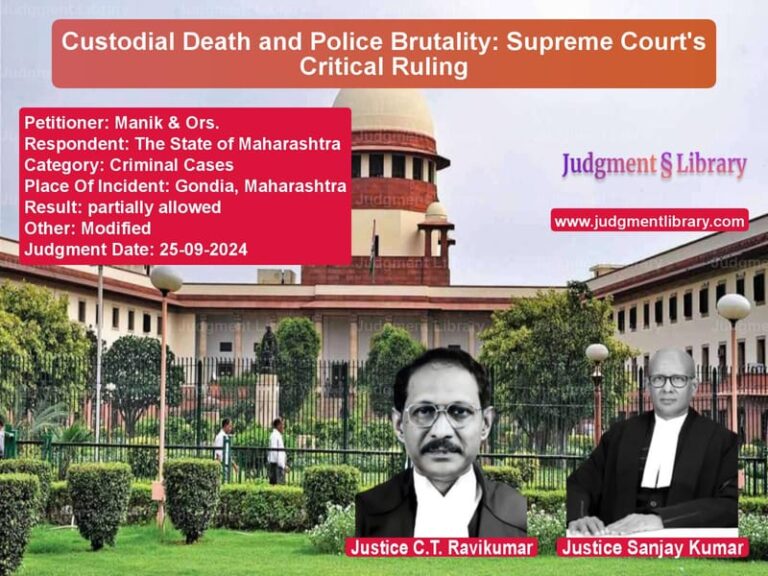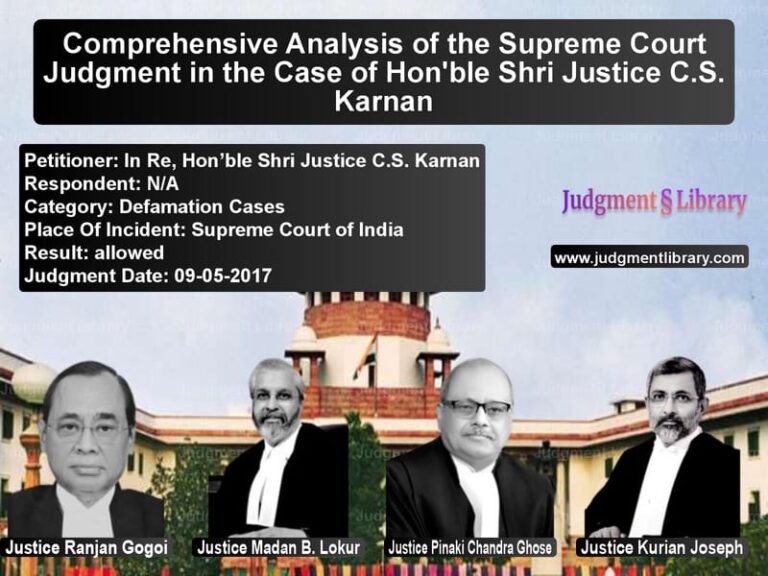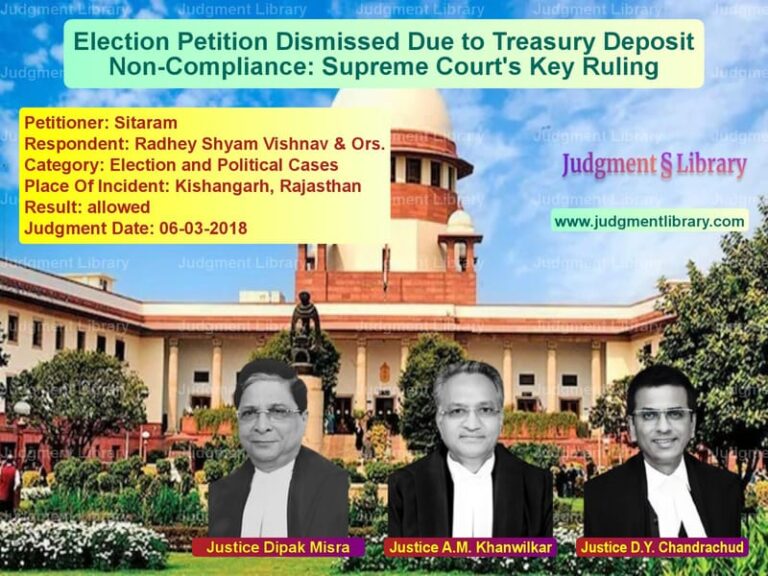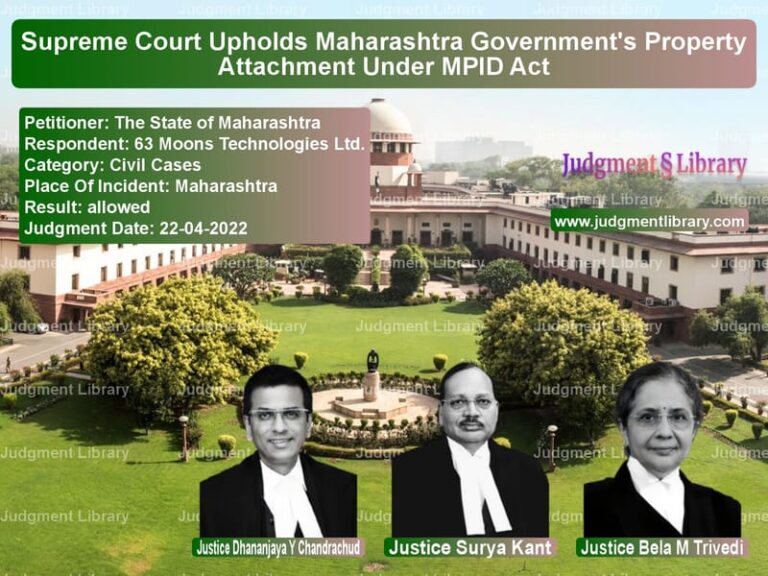Environmental Clearance and Industrial Operations: Supreme Court’s Verdict on Ex Post Facto Approval
The case of M/S Pahwa Plastics Pvt. Ltd. and Anr. vs. Dastak NGO and Ors. is a landmark judgment concerning the validity of industrial operations pending environmental clearance. The Supreme Court’s ruling clarifies the position on ex post facto environmental clearance (EC) and its impact on industries operating without prior EC.
The appeal was filed under Section 22 of the National Green Tribunal (NGT) Act, 2010, challenging an order passed by the Principal Bench of the NGT on June 3, 2021. The NGT had directed that industrial units operating without prior EC should be shut down until they obtained clearance. The Supreme Court, after careful consideration, set aside the NGT’s ruling and allowed the industries to operate pending EC issuance.
Background of the Case
The primary question before the Court was whether an industrial establishment employing thousands of workers, set up with Consent to Establish (CTE) and Consent to Operate (CTO) from the relevant pollution control authorities, could be ordered to shut down pending ex post facto EC, despite complying with pollution norms.
The appellants, M/S Pahwa Plastics Pvt. Ltd. and another company, operated manufacturing units producing formaldehyde. Their units had obtained CTE and CTO from the Haryana State Pollution Control Board (HSPCB) and had applied for ex post facto EC.
Arguments Presented by the Appellants
The appellants contended:
- Their manufacturing units had been operating with valid CTE and CTO.
- HSPCB itself was unclear on whether EC was required for such units.
- Based on official permissions, they had invested significantly in infrastructure and employed approximately 8,000 workers.
- They had applied for EC and had undergone public hearings, leaving only the final procedural step for approval.
- Shutting down their units would cause irreparable economic loss and job losses.
Arguments Presented by the Respondent
The NGO Dastak and other respondents argued:
- Operating without prior EC was a violation of environmental laws.
- The principle of ‘polluter pays’ should apply, and violators should not be allowed to operate until full compliance.
- Environmental impact assessments must be conducted before an industrial operation begins, not afterward.
- Allowing ex post facto EC would encourage non-compliance with environmental laws.
Supreme Court’s Observations and Verdict
The Supreme Court held that while obtaining prior EC was necessary, industries could not be ordered to shut down merely due to procedural lapses if they otherwise complied with environmental norms. The Court made the following key observations:
- Ex post facto EC should not be granted as a matter of routine but could be considered in exceptional circumstances.
- Industries operating with valid pollution control board permissions should not face immediate closure.
- HSPCB itself had initially permitted such operations, and businesses relied on these approvals in good faith.
- Shutting down industries with thousands of workers based on procedural lapses would have severe economic consequences.
Legal Precedents Considered
The Court referenced several judgments:
- Alembic Pharmaceuticals Ltd. v. Rohit Prajapati (2020): Held that ex post facto EC is against environmental jurisprudence but stopped short of ordering the closure of functioning industries.
- Electrosteel Steels Ltd. v. Union of India (2021): Ruled that procedural lapses should not lead to the closure of an industry if environmental compliance could be ensured.
- Lafarge Umiam Mining Pvt. Ltd. v. Union of India (2011): Applied the doctrine of proportionality in environmental matters.
Supreme Court’s Decision
Based on these principles, the Supreme Court ruled:
- The appeal was allowed, and the NGT order was set aside.
- The industries were permitted to continue operations while their EC applications were being processed.
- HSPCB and the Ministry of Environment, Forest and Climate Change (MoEF&CC) were directed to decide on the EC applications within one month.
- If EC was ultimately denied due to any contravention, authorities could take appropriate action, including stopping operations.
Impact of the Judgment
This ruling has significant implications:
- It affirms that procedural lapses should not automatically lead to closure if environmental norms are met.
- It highlights the need for regulatory clarity before businesses make major investments.
- It balances environmental concerns with economic stability and employment.
The judgment underscores the importance of responsible environmental governance while ensuring that industries are not penalized unfairly due to regulatory ambiguities.
Petitioner Name: M/S Pahwa Plastics Pvt. Ltd. and Anr..Respondent Name: Dastak NGO and Ors..Judgment By: Justice Indira Banerjee, Justice J.K. Maheshwari.Place Of Incident: Haryana.Judgment Date: 25-03-2022.
Don’t miss out on the full details! Download the complete judgment in PDF format below and gain valuable insights instantly!
Download Judgment: ms-pahwa-plastics-p-vs-dastak-ngo-and-ors.-supreme-court-of-india-judgment-dated-25-03-2022.pdf
Directly Download Judgment: Directly download this Judgment
See all petitions in Environmental Cases
See all petitions in Judgment by Indira Banerjee
See all petitions in Judgment by J.K. Maheshwari
See all petitions in allowed
See all petitions in Quashed
See all petitions in supreme court of India judgments March 2022
See all petitions in 2022 judgments
See all posts in Environmental Cases Category
See all allowed petitions in Environmental Cases Category
See all Dismissed petitions in Environmental Cases Category
See all partially allowed petitions in Environmental Cases Category







